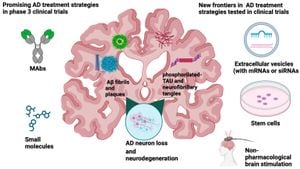A teenager from Derbyshire has been sentenced to life imprisonment after brutally shaking his girlfriend’s four-month-old baby to death. Carl Alesbrook, now 19, committed the horrific offense just weeks after meeting the baby’s mother, India Shemwell, which led to catastrophic injuries for the baby, Elijah Shemwell.
Alesbrook was handed a minimum prison sentence of 14 years at Derby Crown Court, where the judge deemed it necessary for the severity of the crime. The court heard how he was left alone with young Elijah for periods and during this time inflicted serious harm, including severe brain injuries and broken bones.
Elijah died on January 5, 2022, shortly after being found limp and unresponsive at his mother’s home. Just days earlier, alarming video footage taken by Shemwell showing her son gasping for breath was presented to the jury. Despite this, it was documented how she failed to seek timely medical help as she filmed her baby’s distress, seeking instead advice from friends on social media.
During the trial, evidence highlighted not only the physical injuries inflicted on Elijah but also noted Alesbrook’s concerning behavior. The relationship between Alesbrook and Shemwell had quickly escalated, with the defendant sending several abusive messages about the baby to Shemwell prior to Elijah’s hospitalization. On more than one occasion, Alesbrook described Elijah with vile terms, showcasing a lack of regard for the child's well-being.
Despite denying any malice or undue frustration caused by the baby, his actions spoke differently. Testimonies indicated he experienced feelings of jealousy over Shemwell's past relationship with Elijah's biological father. Prosecutors reinforced the argument, stating Alesbrook reacted violently when left alone with the vulnerable infant, leading to the tragic outcome.
The night before Elijah was taken to the hospital, his condition deteriorated swiftly. Following the initial hospitalization, medical professionals discovered numerous bruises on Elijah's body consistent with violent shaking and handle marks. Alesbrook was charged with murder and aggravated assault after the combined evidence revealed the extent of the physical abuse suffered by Elijah.
Elijah had been injured on multiple occasions leading up to his death, with medical assessments describing the severity of the brain injuries as catastrophic—directly resulting from being shaken violently. Alesbrook’s actions not only led to the irreversible trauma inflicted on the infant but stood as evidence of gross negligence and lack of humanity. He was accused of behaving like “a child himself,” which did not excuse his actions, highlighting the expectations placed on caregivers regardless of their age.
India Shemwell, aged 24, was also sentenced to three years for her role in Elijah’s care. Shemwell pleaded guilty to charges of child cruelty, with the court determining she had neglected her duties as a mother, particularly evident from her failure to call emergency services immediately when her son showed signs of distress. Shemwell admitted to being aware of Elijah’s condition but prioritizing her own activities over his needs.
Both individuals faced severe scrutiny and public outrage following the case, which drew attention to child safety and guardianship responsibilities. Alesbrook’s father, Mark Heywood KC, claimed his son was “immature” at the time, but this brought little sympathy from the court, which focused on the severity of the crime rather than Alesbrook’s age or mental state.
Earlier insights from the trial revealed how Shemwell sent videos of Elijah when he appeared unresponsive, seeking validation and help from friends rather than alerting medical professionals. The distress she documented contradicted the rapid response required when witnessing such symptoms. Prosecutors illustrated how the sequence of events formed clear neglect and reckless endangerment of the baby’s life.
Detective Chief Inspector Greg McGill, who led the investigation, emphasized the knowledge teenagers possess around the dangers of extreme physical actions against such vulnerable beings. He noted the undeniable truth: child abuse is never justified, no matter the circumstances, and especially not at the hand of individuals who, like Alesbrook, should have understood the basic tenets of care and respect owed to infants.
The community where both Alesbrook and Shemwell resided grappled with the ramifications of the case. Emphasis arose around the necessity for greater vigilance and support for young parents, many of whom may find themselves overwhelmed, and how systems could be put in place to prevent future tragedies.
Mr. Justice Jeremy Baker, presiding over the Sentencing, addressed the pain felt by Elijah’s family, recognizing how the grief caused by the child’s death could never be fully assuaged by legal penalties. He stated, “The effect of Elijah's death is immeasurable—the weight of pain felt by those who loved him is painfully evident.”
Despite the harsh sentences imposed on both Alesbrook and Shemwell, many within the community and advocacy groups vocalized the call for more preventative measures and educational resources for young parents. The societal focus remains on how to mitigate risks associated with child care and ensuring all children are provided with safe, nurturing environments.
This intense case serves not only as a reminder of the tragic impacts of child abuse but highlights the importance of responsibility when caring for those unable to fend for themselves. The road toward justice, though paved with grief, accentuates the need for protection and awareness surrounding child welfare.



